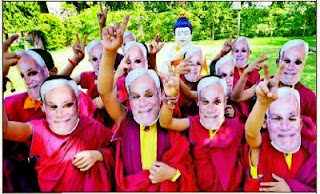 |
| Aamir Khan: Muffling an 'ethical' laugh? |
For all the hot air about voting as a right and duty, it is being hawked by brand ambassadors. After dithering (over what?), actor Aamir Khan has come on board as the voice of conscience. The Election Commission now has stars in its eyes with its own “national icon”.
The video spot, interestingly, does not just stop at Aamir asking people to vote. The cinestar, known for his "perfectionist" approach, also exhorts people to vote ethically...Aamir asks people to resolve to vote without fear, pressure or inducement, financial or otherwise. As the musical score of 'Saare Jahan Se Achcha' plays in the background, Aamir is shown tying a tricolour thread on his wrist and taking a pledge not to "sell" his vote in the name of religion, caste or any other inducement. "I pledge that I will untie this tricolour thread only after I have cast my vote in these elections," he says and calls upon people to take the same pledge.
Will Aamir Khan take a pledge not to portray a corrupt politician on screen ever? Will he ensure that his peers in the film industry and those in advertising, of which he is a part, take all payments in cheque and do not endorse any unethical product?
Politics is about social discourse too. You cannot be ethical selectively. What does tying a tricolour thread mean when TV ads sell pasta in the colour of the national flag? So, you can keep eating it to vote ethically?
---
The EC’s role raises important questions. Does a state channel have any business to play moral vigilante? Are voters under tutorship of the Election Commission? Is the definition of ethical by the authorities the same as or similar to that of voters with varied issues and from different strata?
A few days ago the EC in Maharashtra, after appealing to voters to avoid corrupt and criminal, and choose “pro-development”, candidates went further in its enthusiasm and wanted us to sign a pledge:
The letter, written in Marathi for Maharashtra's voters and in other regional languages for people from other states, urges voters to elect a candidate who will 'meet the aspirations of the people and the nation as a whole,' thus making it clear that they should look beyond narrow agendas...and to 'inspire and encourage friends and family members' to vote in this fashion.
The job of the EC is to ensure that candidates follow rules, and do not indulge in corrupt or criminal activities, and that includes going against campaign rules. It must ensure there is no cross voting and people are not denied their right due to goof-ups. It is not the job of the EC to advise on how and who to vote for. If a candidate is hiding assets, how is a voter to know about it? What exactly does pro-development mean? Is the EC also riding a wave? It is also obvious that this is to target the educated middle class. Is this pledge being signed in the slums and rural areas, where the poor often vote for freebies? This is the more obvious aspect, for the rest are bribed with other promises, if not passing of files and berths.
And truth be told, we would not vote if we were not offered something in return. It is barter, and for whatever it is worth the voter is at least empowered by such knowledge. The EC is infantilising the procedure. Like a bunch of obedient students, after we sign the pledge, “Voters can either give the letter back to the school or submit at the nearby polling centres or election offices before or at the time of voting”.
This contradicts anonymous voting, for the pledge will have our name, signature, polling station number and name, assembly segment number and name. This is not only unlawful, but unethical.
---
If you want ethics, and however much you may snigger, it is in this rather basic move by Rakhi Sawant, an item girl in Bollywood. I am deliberately highlighting it because it is a job for which she earns and has declared her assets. There is more:
And in an interesting first from the zone, the debutant has submitted Annexure 16 detailing her expenses on public meetings and rallies. Also, she was the only one to specify the number of vehicles to be used in her campaign, the proposed expenses on pandals, lights, furniture, posters, etc.
The other actor who is getting noticed is BJP’s Smriti Irani, automatically considered worth attention and respect because she has enacted ‘bahu’ roles in TV soaps. This has been marketed as the USP by her party. Ironical, for she is contesting in Amethi against Rahul Gandhi, whose mother Sonia has often been called out for being just a dynasty bahu. That apart, politics is unforgiving business. The Aam Aadmi Party’s Kumar Vishwas took a potshot at her:
“The message has reached villages. Now it doesn’t matter whether Irani comes, Pakistani comes, Italian or American ... Amethi has already taken a decision.”
Vishwas is a stand-up comic. He is also silly. However, the reaction, especially about the Pakistan reference, is astounding. The earlier NDA government was behind the huge PR exercise called the Agra Summit.
This particular statement does not qualify as misogyny, although there have been way too many instances, including the term ‘Hate Hags’ used for the BJP’s women candidates. It is a patriarchal system where the only manner in which women can be reduced is to personalise/sexualise their identities. Every party has indulged in such lookism fantasies.
Worse, it is disgusting to watch that panellists in discussions are repeating the offensive terms. How does that work against hate speech?
End note:
Look at this picture of Buddhist monks in Bihar wearing Nitish Kumar masks.
© Farzana Versey
---
Images: Hindustan Times, Times of India



